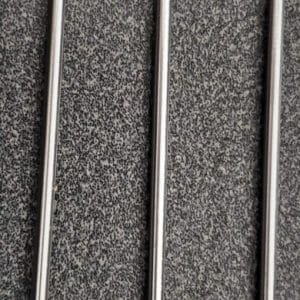Arkansas Stones – the only known substance that can sharpen and polish.
WE ARE REPLACING THE 6″ X 1″ X 1″ STONES WITH 6″ X 1″ X 1/2″ STONES. They will perform just as well, are easier to handle, and will be less expensive than the larger stones.
Our Arkansas Stones are available in 6″ x 1/2″ x 1/2″ and 6″ x 1/2″ x 1″, perfect for the gunsmith workbench. Useful when doing trigger work and for use on the hammer, sear, and disconnector, and for smoothing and polishing any metal part you can apply the stone to.
- Graded by Hardness
- Harder is Finer
- All of our Arkansas Stones are Natural, Quarried Stones
- Use dry, with water, or preferably with oil on Arkansas Stones – a lubricant such as water or oil will float fine pieces of metal off the surface for ease of cleanup and to prevent the stones’ pores from becoming filled with metal particles.
Available in different densities (hardness) and colors. As this is a natural stone, colors and patterns vary, even with the black stones:
- Soft Arkansas
- Hard Arkansas
- Black Arkansas
- Translucent – often multi colored
- Surgical Black Arkansas
Although there may be only a slight difference in grain size from one grade to another, the effective abrasiveness of each grade is related to the density, or compactness, of the individual, bladed quartz crystals that compose Novaculite. The U.S. government measures the specific gravity of Novaculite and assigns density ranges for the Soft and Hard classifications (see FAQ below).
FAQ:
What is the density of the four grades of Arkansas stones?
Soft: 2.25 to 2.30, Hard: 2.30 to 2.45, Black: 2.55+, Translucent: 2.55+
What grit are Arkansas Stones?
- Soft Arkansas – Grit Equivalent: 1200 | 12 micron
- Hard Arkansas – Grit Equivalent: 1500-1700 | 10-11 micron
- Black Arkansas – Grit Equivalent: 2300-2500 | 7-7.5 micron
- Translucent Arkansas – Grit Equivalent: 3500-4000 | 5.5-6 micron
- Surgical Black – Grit Equivalent: 3500-4000 | 5.5-6 micron
Can stones be used dry?
Not recommended – when used without water or oil, Arkansas Stones will become clogged with the waste material from sharpening which will make them work more slowly.
What kind of oil should be used with the stones?
We recommend a light mineral oil designed for sharpening. This type of oil will not harden and gum up stones like a vegetable based oil eventually will.
Can they be used with water instead of oil?
While use of water will not harm the stones, we recommend using honing oil. The main difference between the two is, with the use of oil, some oil remains in the stone after a sharpening session, so the stone is always at least partially charged with oil the next time it is needed. A stone soaked in water dries out between uses.
Are Arkansas stones “extinct”?
No. This fallacy falls under “heard it on the internet”. There are literally mountains of it. The amount of novaculite that exists in the Ouachita Mountains will allow for the continued production of Arkansas sharpening stones for the indefinite future.









Reviews
There are no reviews yet.